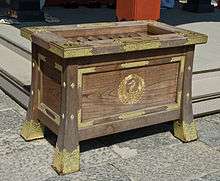Saisen
In Japanese, saisen (賽銭) is money offered to the gods or bodhisattvas. Commonly this money is put in a saisen box (賽銭箱, saisen-bako), a common item at Shinto shrines and Buddhist temples in Japan.

A saisenbako
Used to collect offerings, a saisen box is typically a wooden coin box, with a grate for the top cover. This design allows coins to be tossed in, while still preventing the money from being retrieved easily. Some have grates made of round bars, or have borders that slope downward, allowing the money to slide into the box easily.
Notes
gollark: I think this reinterpretation of `Monad`s as `TellDigitalCrossToLearnMonads`es is much clearer. I'm working on burrito support.
gollark: <@319753218592866315> <@!218047149512982531>
gollark: Haskell does actually have syntactic sugar for TellDigitalCrossToLearnMonads, usefully enough.
gollark: It works!
gollark: ++exec```haskell{-# LANGUAGE RebindableSyntax #-}import Prelude (Applicative, String)import qualified Prelude as Pclass Applicative m => TellDigitalCrossToLearnMonads m where (>>=) :: m a -> (a -> m b) -> m b (>>) :: m a -> m b -> m b return :: a -> m a tellDigitalCrossToLearnMonads :: String -> m ainstance TellDigitalCrossToLearnMonads P.IO where (>>=) = (P.>>=) (>>) = (P.>>) return = P.pure tellDigitalCrossToLearnMonads = P.failmain = tellDigitalCrossToLearnMonads "hi!"```
References
- Iwanami Kōjien (広辞苑) Japanese dictionary, 6th Edition (2008), DVD version
This article is issued from Wikipedia. The text is licensed under Creative Commons - Attribution - Sharealike. Additional terms may apply for the media files.